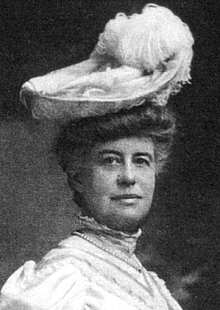Helena Ely Fairchild (née Rutherfurd; September 28, 1858 – May 18, 1920) was an American amateur gardener, founding member of the Garden Club of America, and writer, whose three books influenced American and British gardeners to avoid Victorian formal gardens in favor of plantings that embodied an "informal and sensual style."[1] She focused on planning her gardens around planting "hardy perennial plants found in the agricultural landscape."[2]
Helena Rutherfurd Ely | |
|---|---|
 | |
| Born | Helena Rutherfurd September 28, 1858 |
| Died | May 18, 1920 (aged 61) |
| Occupation(s) | Author, gardener |
Biography
editHelena Rutherfurd was born on September 28, 1858,[3] one of five children from the marriage of Charlotte Livingston (1825–1894) and John Rutherfurd (1810–1871), a coal and railroad industry executive, and president of the Board of Proprietors for East New Jersey and the New Jersey Historical Society.[4][5][6]
At Meadowburn, she created formal and cottage gardens on five acres of the estate's grounds which served as the basis for a series of three books on gardening in which she favored perennials. Her first book, A Woman's Hardy Garden (1903) sold 40,000 copies and was reprinted 16 times before going out of print in 1930.[1][2] The book was widely heralded as the most influential practical garden book written by an American woman.[7] Her books promoted an informal and sensual style, which moved away from the Victorian practice of ''bedding out'' showy annuals in formal gardens.[7] They gave permission to individuals to do physical garden work due to her social position; and encouraged women to garden.[8]
In 1904, Ely was one of the founding members of the Garden Club of America and was one of its first vice presidents.[9][7]
Helena Fairchild died on May 18, 1920, aged 61.[6] She was buried in Warwick Cemetery in Warwick, New York.[10] She received fan mail and queries from fellow gardeners 20 years after her death.[1]
Meadowburn Farm
editEly and her husband owned a 350-acre country estate named Meadowburn Farm in Vernon Township, New Jersey. Part of Meadowburn was given to Ely by her mother as a wedding gift in 1881.[7] The remainder, including the main house was purchased by Ely from the DeKay family,[11] a colonial family that had settled in this area in the 1720s and played a prominent role in the New York–New Jersey Line War. The Rutherfurd family owned large tracts throughout Sussex County and was descended from early colonial proprietors.[citation needed] Ely spent half of each year on the farm, experimenting with filling plots with the perennial plants.[7]
In 1930, the property was sold to the Coster family who employed Ely's gardener, Albert Furman, to maintain the property. Under Furman and later his son's guidance, the property retained a great number of Ely's plantings.[7]
On August 9, 1993, Meadowburn Farm was placed on the National Register of Historic Places to recognize Helena Rutherfurd Ely's contributions to gardening.[12][13]
Personal life
editOn June 17, 1880, at Trinity Church, in Newark, New Jersey, she married Alfred Ely II (1852–1914), son of Lucy Cooley and Alfred Brewster Ely, who was an attorney and partner in the New York City law firm Agar, Ely & Fulton.[3][4][6] They had two children: a son Alfred (III) (1884–1959) and daughter Helena (1881–1970).[6] After her husband's death, Helena Ely married Benjamin T. Fairchild in 1916.[6]
Works
edit- 1903: A Woman's Hardy Garden
- 1905: Another Hardy Garden Book
- 1911: The Practical Flower Garden[14]
See also
editReferences
edit- ^ a b c Druse, Ken, via The New York Times News Service. "Pioneering gardener's planting style lives on", U-T San Diego, July 11, 2004. Accessed March 11, 2013.
- ^ a b The Cultural Landscape Foundation: Helena Rutherfurd Ely 1858–1920. Retrieved January 6, 2013.
- ^ a b "Ely" in Bergen, Tunis Garret. Genealogies of the State of New York: A record of the achievements of her people in the making of a commonwealth and the founding of a nation – Long Island Edition. (New York: Lewis Historical Publishing Company, 1913) III:1221–1222.
- ^ a b The New York Genealogical and Biographical Record (New York: The New York Genealogical and Biographical Society, 1880), XI:159
- ^ Swords, Robert S. "Memoir of the Life and Character of John Rutherfurd, Late President of the New Jersey Historical Society," in Proceedings of the New Jersey Historical Society, Second Series, 2:197–204.
- ^ a b c d e Archives: Documents, Manuscripts, Maps, & Photographs – Manuscript Group 484, Rutherfurd-Ely Family. New Jersey Historical Society, Newark, New Jersey. Retrieved January 6, 2013.
- ^ a b c d e f meadowburnfarm. "Helena Rutherfurd Ely – Meadowburn Farm". Retrieved November 8, 2019.
- ^ Initiative (Project), Historic Landscape (1995). Pioneers of American Landscape Design II: An Annotated Bibliography. U.S. Department of the Interior, National Park Service, Cultural Resources, Heritage Preservation Services, Historic Landscape Initiative. ISBN 9780160480607.
- ^ Druse, Ken (June 24, 2004). "GARDEN NOTEBOOK; Where Victorians Met Their Match". The New York Times. ISSN 0362-4331. Retrieved November 8, 2019.
- ^ Dupont, Ron. Warwick Cemetery Archived August 18, 2012, at the Wayback Machine, Sussex County Historical Society, Newton, New Jersey. Retrieved January 6, 2013.
- ^ Deed from Henry B. DeKay to Alfred Ely, 1880, Manuscript Group 484 Rutherfurd-Ely Family, New Jersey Historical Society, Newark, New Jersey.
- ^ Dupont, Ronald J., Jr. Images of America: Vernon Township, p. 94. (Charleston, SC: Arcadia Publishing, 2002), ISBN 0738511102. Accessed March 11, 2013.
- ^ New Jersey – Sussex County, National Register of Historic Places. Accessed March 11, 2013.
- ^ "Review of The Practical Flower Garden by Helena Rutherfurd Ely". The Athenæum (4362): 632. June 3, 1911.
Further reading
edit- Dupont, Ronald J., Jr. "Meadowburn Farm: A Flower of American Gardening History," in The North Jersey Highlander Vol. 30 No. 84 (1994), pp. 23–33.